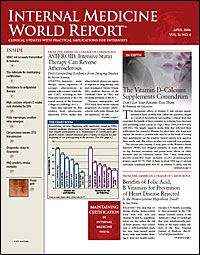Plan B Stalled Again: Science or Politics?
Plan B Stalled Again: Science or Politics?
the emergency contraceptive marketed in the United States since 1999 as Plan B has suffered an
unexpected setback yet again. Earlier this summer, the FDA had announced it would finalize its decision by September 1 regarding making the prescription-only product also available over-the-counter (OTC), asrequested by its manufacturer, Barr Laboratories, consistent with studies showing that increased access to the drug would minimize unwanted pregnancies and its
ability to reduce the chance of pregnancy by as much as 89%. But in late August, the FDA decided to postpone its decision yet again, citing insufficient safety data. The emergency contraception (not to be confused with RU-486, the “abortion pill”) consists of 2 tablets of levonorgestrel, 0.75 mg each, which should be taken 12 hours apart within 72 hours after sexual intercourse to prevent unwanted conception from taking place. Plan B has been caught in a maelstrom of accusations of political posturing, denials, and counterdenials. The twists and
turns in the attempt to receive FDA approval for OTC marketing are worthy of an Agatha Christie novel, but with serious medical implications. In December 2003, the road to approval appeared to be wide open. Two FDA expert advisory committees overwhelmingly recommended approval by a vote of 23 to 4 after a review of more than 15,000 pages of clinical data. The recommendations of scientific committees are typically followed by the FDA without question. However, 5 months later, Steven Galson, MD, MPH, acting director of the FDA’s Center for Drug Evaluation
and Research, sent a letter to the manufacturer indicating that its application for OTC status was being rejected because it had “not provided adequate data to support a conclusion that Plan B can be safely used by young adolescent women” without the supervision of a physician,
and that Barr’s amended application to limit OTC availability to women ≥16 years of age did not include adequate “draft product labeling.” The FDA’s claim that there were insufficient data on safety in adolescents was refuted in a report published in the Journal of the American Medical Association (2004; 291:2805-2806), which pointed out that both a Barr-sponsored clinical trial that
included 29 girls aged 14 to 16 years and earlier studies that included several hundreds
of 15- and 16-year-old girls demonstrated that the progestin-only (levonorgestrel)
emergency contraceptive is safe in this age-group. The FDA’s decision was met with a torrent
of criticism. The American College of Obstetricians and Gynecologists issued a
statement describing the FDA’s failure to accept the committees’ recommendations
for OTC status as “morally repugnant” and “a dark stain on the reputation of an
evidence-based agency like the FDA” (May 7, 2004). Estimates suggest that if emergency
contraception was readily available and used, half of unintended pregnancies could
be prevented (Fam Plann Perspect. 1992;24: 269-273). Many of the concerns cited by the opponents of easier access to Plan B have been found to be groundless in clinical trials. A
recent study of 2117 women aged 15 to 24 years showed that women who were given emergency contraception in advance were twice as likely to use it as women who had
to obtain it at a clinic (controls), even though both groups had a similar frequency
of unprotected sex (JAMA. 2005;293: 54-62). In addition, women who had the
product in advance or who had pharmacy access to it did not have more sexually
transmitted infections than controls. Defending the FDA’s recent vote to postpone
the final decision, then-FDA commissioner Lester Crawford issued a statement on August 26, 2005, emphasizing that the issues raised by this case “presented us with
many difficult and novel policy and regulatory issues.” It involved unprecedented
questions, including, “Can age be used as a [sole] criterion on which to decide whether
a drug should be prescription or over-thecounter...? Can the prescription and overthe-
counter version of the same drug be marketed in a single package?...The answers
to these questions can establish very broad and far-reaching policies.” To expedite
the final decision, Dr Crawford “opened a 60-day comment period instead
of the usual 90 to 120 day comment period,” allowing the public to comment on
“whether a product can be labeled for overthe- counter and prescription and be sold in
the same package.” This period ends on November 1. Protesting the decision, Susan F. Wood,
PhD, the assistant FDA commissioner for women’s health and director of the Office
of Women’s Health for the past 5 years, resigned her position, saying “I can no
longer serve as staff when scientific and clinical evidence, fully evaluated and recommended
for approval by the professional staff here, has been overruled” (The Washington Post. September 1, 2005;A08). Phyllis Greenberger, president and CEO of the Society for Women’s Health Research, commented, “While the Plan B issue is clearly something that concerns us,
the larger issue of politicization of science…is of grave concern to us.”
